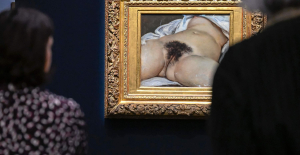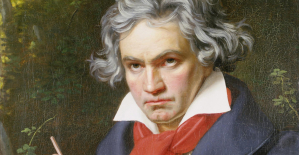This article is taken from Figaro Hors-série Van Gogh, la Symphonie de l'Adieu, a special issue published on the occasion of the exhibition at the Musée d'Orsay Van Gogh, Les Derniers Jours, which retraces the life and work of the artist, from his Dutch youth to his tragic end in Auvers sur Oise.
What will Vincent do in life? The question arises all the more acutely since he stopped his studies. In 1869, he was sixteen years old. Since he doesn't know what to do, his parents take matters into their own hands. They will decide his future. They bring together a family council. In the circle that was formed, there was Uncle Cent, the art dealer from The Hague, who now lives retired from business in Princenhage, near Breda. For Uncle Cent, the problem is simple. Why wouldn’t Vincent pursue the career in which he himself has been so successful? He is ready to recommend it to Mr. Tersteeg, who manages the branch of the Goupil gallery
In 1872, Vincent received a visit from his brother Theo. He tells her about his job, about the Goupil gallery. When Theo leaves him, Vincent writes to him immediately. Then begins a long correspondence (six hundred and ninety-seven letters), which will continue throughout their lives. Few artists, like Vincent, have been driven by an obsessive need to justify themselves, to express their passions and their doubts, to reveal their most intimate crises. In May 1873, Vincent, who was transferred to the English subsidiary of Goupil
Back in England, he joined as an assistant teacher. On December 31, 1876, he found himself at his parents' house, now living in Etten. He only stayed there for three weeks and left for Dordrecht. There, from January 21 to April 30, 1877, he worked in another profession: he was a bookstore clerk. Not for a long time. He feels more and more like he has a religious vocation. He went to Amsterdam to study theology. He will be a pastor. Like his father, like his grandfather. But he abandoned his studies in July 1878. After a short stay in Etten, in August he entered an evangelist school in Laeken, near Brussels. After three months of training, he was fired on November 15, 1878. Stubborn, he was not discouraged. He leaves on his own for Borinage. He settled in Pâturages then in Wasmes where rows of gray houses stand with their soot-colored gardens. Around him, a large, treeless coal plain dotted with slag heaps, these mounds of black waste. Over this gray plain there is a sound of dirty skies. And then, there are these hundreds of men, women and children who spend their lives handling the bar and the pick in the galleries at the bottom of the earth. For them, the sun only lights up the world one day out of seven, on Sunday. Vincent wants to be as miserable as these wretches. He dresses like them. He lives in a cabin built of planks. He sleeps on a pallet. He cuts pants from miners' bags and puts on clogs. Like them. He visited the sick, taught catechism to children, and taught them to read and write. He speaks in the name of Christ. Distraught, the Protestant consistory asked Vincent to immediately cease his apostolate. Vincent packs his backpack, throws it over his shoulder. He sinks, passing forgotten, in the gray day, on the road to Brussels. Behind him, voices whisper: “We thought he was crazy, maybe he was a saint. »
“Van Gogh, the Farewell Symphony”, 164 pages, €13.90, available on newsstands and on the Figaro Store.

 Israel-Hamas war: Gaza between hope of truce and fear of Israeli offensive in the South
Israel-Hamas war: Gaza between hope of truce and fear of Israeli offensive in the South “Mom, Dad, please don’t die”: in the United States, a nine-year-old child saves the lives of his parents injured in a tornado
“Mom, Dad, please don’t die”: in the United States, a nine-year-old child saves the lives of his parents injured in a tornado War in Ukraine: Putin orders nuclear exercises in response to Macron and “Western leaders”
War in Ukraine: Putin orders nuclear exercises in response to Macron and “Western leaders” Mexico: the last moments of surfers found in a well, killed with a bullet to the head
Mexico: the last moments of surfers found in a well, killed with a bullet to the head A baby whose mother smoked during pregnancy will age more quickly
A baby whose mother smoked during pregnancy will age more quickly The euro zone economy grows in April at its best pace in almost a year but inflationary pressure increases
The euro zone economy grows in April at its best pace in almost a year but inflationary pressure increases Children born thanks to PMA do not have more cancers than others
Children born thanks to PMA do not have more cancers than others Breast cancer: less than one in two French women follow screening recommendations
Breast cancer: less than one in two French women follow screening recommendations “A potential environmental disaster”: Paris town hall opposes an oil drilling project in Seine-et-Marne
“A potential environmental disaster”: Paris town hall opposes an oil drilling project in Seine-et-Marne The governor of the Banque de France pleads for the development of French and European AI
The governor of the Banque de France pleads for the development of French and European AI Clariane (ex-Korian) announces a sale of its home hospitalization activities
Clariane (ex-Korian) announces a sale of its home hospitalization activities To everyone's surprise, the Hades 2 event video game is released in early access
To everyone's surprise, the Hades 2 event video game is released in early access The Origin of the World, exhibited at the Center Pompidou Metz, target of an “artistic performance”
The Origin of the World, exhibited at the Center Pompidou Metz, target of an “artistic performance” Threatened with death for having insulted the mobilized pro-Palestinian students, Élie Semoun files a complaint
Threatened with death for having insulted the mobilized pro-Palestinian students, Élie Semoun files a complaint Vienna, Paris, Milan celebrate the 200th anniversary of Beethoven's 9th Symphony
Vienna, Paris, Milan celebrate the 200th anniversary of Beethoven's 9th Symphony Cannes Film Festival: call for strike one week before opening
Cannes Film Festival: call for strike one week before opening Omoda 7, another Chinese car that could be manufactured in Spain
Omoda 7, another Chinese car that could be manufactured in Spain BYD chooses CA Auto Bank as financial partner in Spain
BYD chooses CA Auto Bank as financial partner in Spain Tesla and Baidu sign key agreement to boost development of autonomous driving
Tesla and Baidu sign key agreement to boost development of autonomous driving Skoda Kodiaq 2024: a 'beast' plug-in hybrid SUV
Skoda Kodiaq 2024: a 'beast' plug-in hybrid SUV The home mortgage firm rises 3.8% in February and the average interest moderates to 3.33%
The home mortgage firm rises 3.8% in February and the average interest moderates to 3.33% This is how housing prices have changed in Spain in the last decade
This is how housing prices have changed in Spain in the last decade The home mortgage firm drops 10% in January and interest soars to 3.46%
The home mortgage firm drops 10% in January and interest soars to 3.46% The jewel of the Rocío de Nagüeles urbanization: a dream villa in Marbella
The jewel of the Rocío de Nagüeles urbanization: a dream villa in Marbella Europeans: David Lisnard expresses his “essential and vital” support for François-Xavier Bellamy
Europeans: David Lisnard expresses his “essential and vital” support for François-Xavier Bellamy Facing Jordan Bardella, the popularity match turns to Gabriel Attal’s advantage
Facing Jordan Bardella, the popularity match turns to Gabriel Attal’s advantage Europeans: a senior official on the National Rally list
Europeans: a senior official on the National Rally list Blockade of Sciences Po: the right denounces a “drift”, the government charges the rebels
Blockade of Sciences Po: the right denounces a “drift”, the government charges the rebels These French cities that will boycott the World Cup in Qatar
These French cities that will boycott the World Cup in Qatar Foot: Italian football protests against a government project which aims to monitor club finances
Foot: Italian football protests against a government project which aims to monitor club finances Champions League: “We are ready for anything,” warns Edin Terzic before PSG-Dortmund
Champions League: “We are ready for anything,” warns Edin Terzic before PSG-Dortmund Premier League: David Moyes to leave West Ham at end of season
Premier League: David Moyes to leave West Ham at end of season Transat CIC: Yoann Richomme winner in the wake of Tabarly, Poupon, Peyron, Desjoyeaux...
Transat CIC: Yoann Richomme winner in the wake of Tabarly, Poupon, Peyron, Desjoyeaux...


















